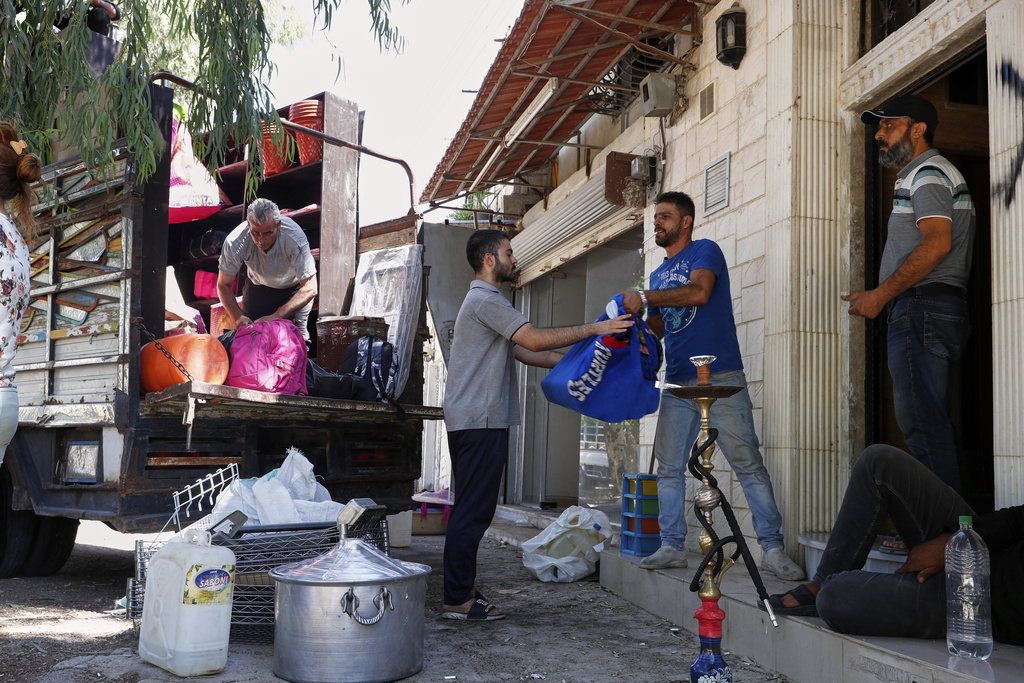Many of Syria’s Alawite religious minority are leaving a Damascus suburb where thousands of their members live in ramshackle houses, days after it was raided by a Syrian pro-government armed faction who beat and arrested many and ordered them to evacuate their homes.
The Muslim minority group was seen as privileged under the rule of the Alawite Assad family, but since Bashar Assad’s government fell late last year, members have feared revenge from the country’s Sunni majority.
Though government officials later said there was no such eviction order, many residents of Sumariya packed their belongings into trucks and left their homes, fearing further attacks.
A fragile situation
The incident illustrated how delicate the situation in Syria is nearly nine months after Assad was ousted in a rebel offensive, ending 50 years of his family’s rule.
United Nations spokesperson Stéphane Dujarric on Friday said U.N. officials were “following with concern the developments … including reports of threats of evictions and the reports of abuses against innocent civilians, including women and children.”
Assad was a member of the Alawite minority, and during his time, Alawites were disproportionately represented in the security and intelligence forces. The Sumariya area, northwest of Damascus, once contained military housing, including for members of the 4th Armored Division, which Syrian opposition activists accused of carrying out extrajudicial killings, torture, extortion and drug trafficking.
Most of the 4th division members fled the area when Assad fell. But civilian families also lived there, many in small, shoddily constructed single-story houses.
Mohammad Ibrahim, a retired government worker, told The Associated Press on Saturday he had bought his small house in 2010, and later got a court decision making the ownership official.
“The walls, if you hit them, they will break, and the doors are the same. It’s housing for the most basic level of living,” he said.
The threat of eviction
The Syria Report, a publication tracking the country’s economy, said Sumariya emerged in the 1980s on land expropriated from the town of Moadamiyat al-Sham. It noted that “many current occupants lack official documents proving their ownership or rental agreements, making them vulnerable to sudden eviction.”
But even those with documentation said they were threatened and ordered to evacuate.
Ragda Jerawa, a mother of two and government employee living in one of the small houses in Sumariya, said that residents had been told that an inspection committee would come Thursday to check ownership papers.
“We had our papers ready, so we thought that’s it, no one would bother us,” she said. “The next day I went to work, and my husband called me saying they came in, beat him up and beat up my son, and they didn’t even ask for papers.”
Jerawa said the armed men told residents that they must leave within 48 hours, “otherwise we’ll demolish the houses over your heads.” Some men were rounded up, detained, beaten and coerced into signing documents giving up their houses, she said.
Karam Khuzam, head of the neighborhood committee, said it had been notified by security officials that inspectors would come to issue eviction orders for some illegally constructed homes whose residents did not have ownership papers for them.
There had been a court order issued in 2004 legalizing the ownership of land in Sumariya, he said, but after Assad’s fall, some of the original land owners in Moadamiyat al-Sham said the people who had bought houses in Sumariya no longer had legal standing. However, instead of a legal process to determine ownership, armed men descended on the neighborhood and ordered residents to get out immediately.
“There were some violations — beating and insulting people, random arrests… some of the guys hit women,” Khuzam said.
He said members of the neighborhood committee later spoke with government officials and were told to stay in their houses unless they received an official eviction order from the governor.
Threats continue
Even after being told that there was no official eviction order, residents said members of a local armed faction, led by a man known as Abu Huzaifa, continued to threaten them. Numerous families were too frightened to stay and take their chances.
Many remembered the violence that erupted on Syria’s coast months before, when clashes between security forces and pro-Assad armed groups spiraled into sectarian revenge attacks in which hundreds of Alawite civilians were killed.
Jerawa’s family was packing its modest belongings into a truck on Saturday, preparing to take them to the coastal area of Latakia, although Jerawa feared leaving Damascus would mean losing her job.
“To whom do we complain? Where is the state? We got rid of the old regime, and now what?” she said. “It doesn’t matter anymore … Let them kill us, we’ll be relieved.”
(AP)











